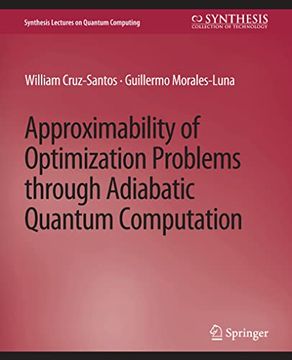Share
Approximability of Optimization Problems Through Adiabatic Quantum Computation (in English)
William Cruz-Santos
(Author)
·
Guillermo Morales-Luna
(Author)
·
Springer
· Paperback
Approximability of Optimization Problems Through Adiabatic Quantum Computation (in English) - Cruz-Santos, William ; Morales-Luna, Guillermo
$ 59.95
$ 99.92
You save: $ 39.97
Choose the list to add your product or create one New List
✓ Product added successfully to the Wishlist.
Go to My Wishlists
Origin: United Kingdom
(Import costs included in the price)
It will be shipped from our warehouse between
Tuesday, June 04 and
Friday, June 14.
You will receive it anywhere in United States between 1 and 3 business days after shipment.
Synopsis "Approximability of Optimization Problems Through Adiabatic Quantum Computation (in English)"
The adiabatic quantum computation (AQC) is based on the adiabatic theorem to approximate solutions of the Schrödinger equation. The design of an AQC algorithm involves the construction of a Hamiltonian that describes the behavior of the quantum system. This Hamiltonian is expressed as a linear interpolation of an initial Hamiltonian whose ground state is easy to compute, and a final Hamiltonian whose ground state corresponds to the solution of a given combinatorial optimization problem. The adiabatic theorem asserts that if the time evolution of a quantum system described by a Hamiltonian is large enough, then the system remains close to its ground state. An AQC algorithm uses the adiabatic theorem to approximate the ground state of the final Hamiltonian that corresponds to the solution of the given optimization problem. In this book, we investigate the computational simulation of AQC algorithms applied to the MAX-SAT problem. A symbolic analysis of the AQC solution is given in order to understand the involved computational complexity of AQC algorithms. This approach can be extended to other combinatorial optimization problems and can be used for the classical simulation of an AQC algorithm where a Hamiltonian problem is constructed. This construction requires the computation of a sparse matrix of dimension 2n × 2n, by means of tensor products, where n is the dimension of the quantum system. Also, a general scheme to design AQC algorithms is proposed, based on a natural correspondence between optimization Boolean variables and quantum bits. Combinatorial graph problems are in correspondence with pseudo-Boolean maps that are reduced in polynomial time to quadratic maps. Finally, the relation among NP-hard problems is investigated, as well as its logical representability, and is applied to the design of AQC algorithms. It is shown that every monadic second-order logic (MSOL) expression has associated pseudo-Boolean maps that can be obtained by expanding the given expression, and also can be reduced to quadratic forms. Table of Contents: Preface / Acknowledgments / Introduction / Approximability of NP-hard Problems / Adiabatic Quantum Computing / Efficient Hamiltonian Construction / AQC for Pseudo-Boolean Optimization / A General Strategy to Solve NP-Hard Problems / Conclusions / Bibliography / Authors' Biographies
- 0% (0)
- 0% (0)
- 0% (0)
- 0% (0)
- 0% (0)
All books in our catalog are Original.
The book is written in English.
The binding of this edition is Paperback.
✓ Producto agregado correctamente al carro, Ir a Pagar.

